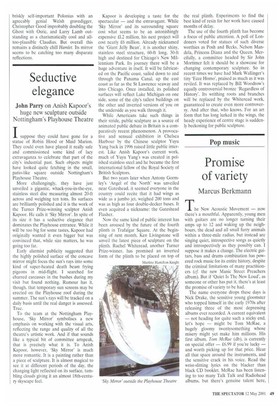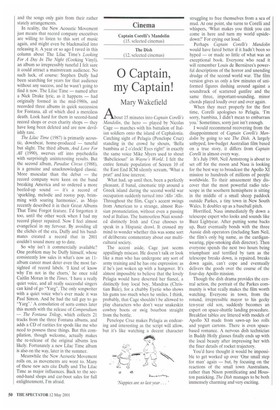Promise of variety
Marcus Berkmann
The New Acoustic Movement — now there's a mouthful. Apparently, young men with guitars are no longer turning their amps up to 12 and waking up the neighbours, the dead and all small furry animals within a three-mile radius, but instead are singing quiet, introspective songs as quietly and introspectively as they possibly can. I suppose it makes a change. The electric guitars, bass and drums combination has powered rock music for its entire history, despite the criminal limitations of many practitioners (cf the new Manic Street Preachers album). But if 'Quiet Is The New Loud', as someone or other has put it, there's at least the promise of variety to be had.
The name everyone drops these days is Nick Drake, the sensitive young gioomster who topped himself in the early 1970s after releasing three of the most depressing albums ever recorded. A current equivalent — not heading for quite such a sticky end, let's hope — might be Tom McRae, a hugely gloomy twentysomething whose misery might yet make him millions. His first album, Tom McRae (db), is currently on special offer — £6.99 if you're lucky — and worth picking up for that price. Hear all that space around the instruments, and the sensitive crack in his voice. Read the wrist-slitting lyrics on the blacker than black CD booklet. McRae has been listening to too many Talk Talk and Radiohead albums, but there's genuine talent here, and the songs only gain from their rather stately arrangements.
In reality, the New Acoustic Movement just means that record company executives are willing to listen to this sort of music again, and might even be blackmailed into releasing it. A year or so ago I raved in this column about The Lilac Time's Looking For A Day In The Night (Cooking Vinyl), an album so irrepressibly tuneful I felt sure it could attract a mainstream audience. No such luck, of course: Stephen Duffy had been searching for years for that audience without any success, and he wasn't going to find it now. The Lilac Time — named after a Nick Drake lyric, as it happens — had originally formed in the mid-1980s, and recorded three albums in quick succession for Fontana, all of which died a merciless death. Look hard for them in second-hand record shops or even charity shops — they have long been deleted and are now devilishly rare.
The Lilac Time (1987) is primarily acoustic, downbeat, home-produced — tuneful but slight. The third album, And Love For All (1990), swerves off into psychedelia with surprisingly uninteresting results. But the second album, Paradise Circus (1988), is a genuine and unacknowledged classic. More muscular than the debut — the record company were keen on the band breaking America and so ordered a more beefed-up sound — it's a record of 'sparkling, melodic and rootsy pop, brimming with soaring harmonies', as Mojo recently described it in their Great Albums That Time Forgot feature. I'd forgotten it too, until the other week when I had my record player repaired. Now I feel almost evangelical in my fervour. By avoiding all the clichés of the era, Duffy and his bandmates created a record that in 2001 couldn't sound more up to date.
So why isn't it commercially available? One problem may be Duffy himself, whose consistently low sales in what's now an 11album career must deter even the most farsighted of record labels. 'I kind of know why I'm not in the charts.' he once told Caitlin Moran in the Times. 'I have a really quiet voice, and all really successful singers can kind of go "Yarg". The only songwriter with a quiet voice who's ever made it was Paul Simon. And he had the tall guy to go "Yarg".' A consolation of sorts comes later this month with the release of Compendium — The Fontana Trilogy, which collects 21 tracks from the three Fontana albums, and adds a CD of rarities for spods like me who need to possess these things. But this compilation, though welcome, actually makes the re-release of the original albums less likely. Fortunately a new Lilac Time album is also on the way, later in the summer.
Meanwhile the New Acoustic Movement rolls on, as movements are wont to. Many of these new acts cite Duffy and The Lilac Time as major influences. Back to the second-hand shops and car-boot sales for full enlightenment, I'm afraid.



































































 Previous page
Previous page